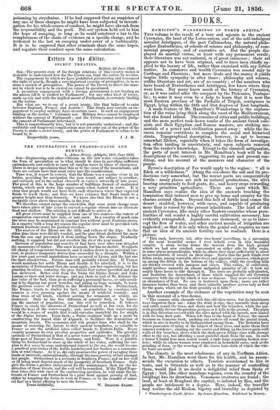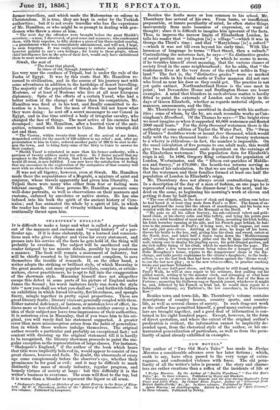BOOKS.
HAMILTON'S WANDERINGS IN NORTH AFRICA.* THIS volume is the result of a tour and sojourn in the ancient Cyrenaica, the land of the Lotus-eaters and of the self-indulgent moralist Aristippus, of the poet Calliniachus, the natural philo- sopher Eratosthenes, of schools of science and philosophy, of-com- mercial prosperity, and of executive art. But the people dis- played no martial virtue, at least with any permanent result; their literature was not national, or of great eminence ; their art appears not to have been original, and to have been chiefly ap- plied to the luxury of life, rather than exercised with any loftier motive. In commerce and wealth Cyrenaica was second only te Carthage and Phcenicia ; but mere trade and the money it yields inspire little sympathy in after times ; philosophy and science, unlike literature and art, are of no country; of the numbers who have heard of Eratosthenes and Aristippus, few know where they were born. Not many know much of the history of Cyrenaica, or, as it was called after the conquest by the Ptolemies, Pentapo-
; to some it may even be a help to learn that it is now the most Eastern province of the Pashalic of Tripoli, contiguous to Egypt, lying within the 24th and 31st degrees of East longitude. A main feature of Mr. Hamilton's Wanderings is the explora- tion of the ruins lying thick along the coast of the Mediterranean, but also found inland. The remains of cities and public buildings, and the more perfect rock-hewn tombs of the ancient Greek colo- nists and their Egyptian and Roman masters, are striking me- morials of a power and civilization passed away ; while the Sa- racen remains contribute to complete the social and historical strata. Topographical description, however, is apt to become somewhat lifeless especially when it takes the form of investiga- tion often landing in uncertainty, and upon subjects removed from the reader's knowledge. Except to the classical antiquarian, the parts of most interest in Mr. Hamilton's book will be the descriptions of the country, annealing its past and present con- dition, and his account of the manners and. character of the people.
Byron's description of Fez would apply to the region : "all is Eden or a wilderness." Along the sea-shore the soil and its pro- ductions vary somewhat, but the worser parts are comparatively fertile : many places are rich in natural productions, the olive bearing enormOusly to feed goats, &c., and heavy crops rewarding a very primitive agriculture. There are spots which Mr. Hamilton says realize the idea of the ancients touching the temptation that induced men to give up home and country for the charms around them. Beyond this belt of fertile land comes the desert • studded, however, with oases, and capable of producing more than is raised by the present inhabitants. The land of the ancient Cyrenaica, like many other Eastern countries whose pecu- liarities of soil render a highly careful cultivation necessary, has evidently, retrograded. Aqueducts are destroyed, so as to inter- cept the flow of water, and other ancient means of irrigation are neglected ; so that it is only where the genial soil requires no care that an idea of its ancient fertility can be realized. Here is a picture. "This road, however, led, after two hours' travelling, to a succession of the most beautiful scenes I ever beheld even m this beautiful country. A steep ravine forms the descent from the high ground which we had now reached, surrounded on either side by lofty rocks, in some places perpendicular, while in others they slant sufficiently to allow an accumulation of mould on their slope. Down this the path winds over fallen rocks, among venerable olive-trees and gigantic cypresses, which grow up among the debris in the bottom of the valleys, while the receding hills are thickly covered with junipers and olives. This valley,. if cultivated, might produce annually an almost unlimited quantity of oil : it took me nearly three hours to ride through it. The trees are probably self-planted, and doubtless the descendants of those which supplied the old Gyrenian commerce with the oil for which it was so famous : they were covered with an abundance of fruit. No care is bestowed upon them ; many are rather immense bushes than trees, and their valuable produce serves only as food for the goats, which eat the fruit greedily as it falls."
Another example of the richness of the vegetation may be seen in this account of a tree-house. •
"The country stills abounds with fine old olive-trees, but its inhabitants have forgotten their use : when the fruit is ripe, they assemble their sheep and cattle round the trees, and shake and beat the branches, while the ani- mals greedily devour the precious produce as it falls to the ground. The plain is in this direction covered with the olive mixed with the caroub, now loaded with its long dark pods. When left thus to the hand of Nature, the coxoub becomes an immense bush, pushing out suckers all round the parent trunk, which in size is hardly to be distinguished among them. The Bedawin have taken possession of many. of the largest of these trees, and make them their summer residence ; clearing out the centre and filling up the lower parts with walls of dry branches above which the dark-green foliage rises with strange effect to the eye, but 'affording a most grateful shade from the sun. In such a bower I found four men seated round a rude forge repairing broken mus- kets; while in others women were employed in household cares, such as the grinding of flour, or the weaving of the coarse hair-cloth of which the win- ter tents are made."
The climate is the most wholesome of any in Northern Africa. In fact, Mr. Hamilton went there for his health, and he recom- mends the excursion to others. Tourists accustomed to live in tents, and to Orientals as well as to the manner of controlling them, would find it no doubt a delightful relief from Syria or Egypt ; but, like other mundane regions, even the country of the lotophagi has its drawbacks. Venomous creatures are found; the land, at least at Benghazi the capital, is infested by flies, and the people are intolerant to a degree. Here, indeed, the traveller may realize the old Moslem bigotry and brutality as depicted by
Wanderings is North _Africa. Si! James Bainilton. Published by Murray. former travellers, and which made the Ma.hometan so odious to Christendom. It is true, they are kept in order by the Turkish authorities • but it is not every traveller who has the experience of Mr. Hamilton, or who might be so prompt in dealing with gen- tlemen who threw a stone at him.
"The next day the offenders were brought before the great Sheikh's secretaiy,—a man, I discovered, of good sense and manners ; who condemned them, with their superior, to fifty- strokes a piece of his three-tailed courbaj, --a punishment which was immediately administered, and will not, I hope, be soon forgotten. It was really necessary to enforce such punishment, however painful to one's own feelings.; for lenity to these people, whose chief intelligence lies in the soles of their feet, would only have emboldened them to more serious attacks."
Siwah, the seat of
"The fount that played, In times of old, through Ammon's shade,"
lies very near the confines of Tripoli, but is under the rule of the Pasha of Egypt. It was by this route that Mr. Hamilton re- turned to civilization and in the course of his journey met with some adventures in addition to the hardships of desert travelling. The majority of the population of Siwah are the most bigoted of Moslems, or at least of Moslems who live at all near European diplomaey. Spite of the efforts of a certain Yusuf, who had a better notion of the change of times than his compatriots, Mr. Hamilton was fired at in his tent, and finally committed to de- tention in a house. But the men of Siwah did not know what they were doing: he sent off a secret messenger to our Consul in Egypt, and in due time arrived a body of irregular cavalry, who changed the face of things. The most active of his enemies had decamped; and. Mr. Hamilton, after a hurried view of the anti- quities, returned with his escort to Cairo. But his triumph did not end thus.
"The Viceroy, within twenty-four hours of the arrival of my letter, despatched orders for the march of 150 soldiers to my relief ; and, after my presentation to him in Cairo, ordered another party of 200 to be sent to dis- arm the town, and to bring forty-nine of the Siwy to Cairo to answer for their conduct.
"Sheikh Yusuf is reinstated in more than his former authority, with a garrison of twenty soldiers under his orders. So I flatter myself that my prophecy to the Sheikhs of Siwah, that I should be the last European they would ill-treat, is now fulfilled. I can now have the satisfaction of feeling that my successors in the exploration of the antiquities of that country will meet with no obstacles to their researches."
It was not all bigotry, however, even at Siwah. Mr. Hamilton made there the acquaintance of a Mograbi, a mixture of saint and conjurer, whose travels apparently had given him liberality. In Tripoli ihere were many who either from fear or feeling were tolerant enough. Of these persons Mr. Hamilton presents some well-done portraits, as well as observations on their mariners and customs, enforced by anecdotes or native stories. He has also infused into his book the spirit of the ancient history of Cyre naica, ; and has animated the whole by a spirit of life, in which the reader has the essence of vivacity without having the mode continually thrust upon him.



























 Previous page
Previous page